Franchise Opportunities By Industry
Franchise Opportunities By Location
Franchise 101
By Investment Level
Franchise Consultant
White Paper
Playbook
Looking for the best franchise investments for 2025? We have dug deep into the marketplace to find the top performers in 9 crucial industries. Each franchise we have singled out has tremendous name recognition, a long track record of being highly profitable, and an all-around support system that is as solid as a rock.
{{most-profitable}}
Using our comprehensive franchise database, we pinpointed prospects that offered us:
When assessing franchise options, think about these principal aspects:
To ascertain these two components before investing in a franchise, one should conduct some simple research. Here are some methods by which to do so:
Here are some of the top most profitable franchises in the education industry, along with information on the number of franchise units, franchise fees, royalties, initial investment range, and profitability margin.
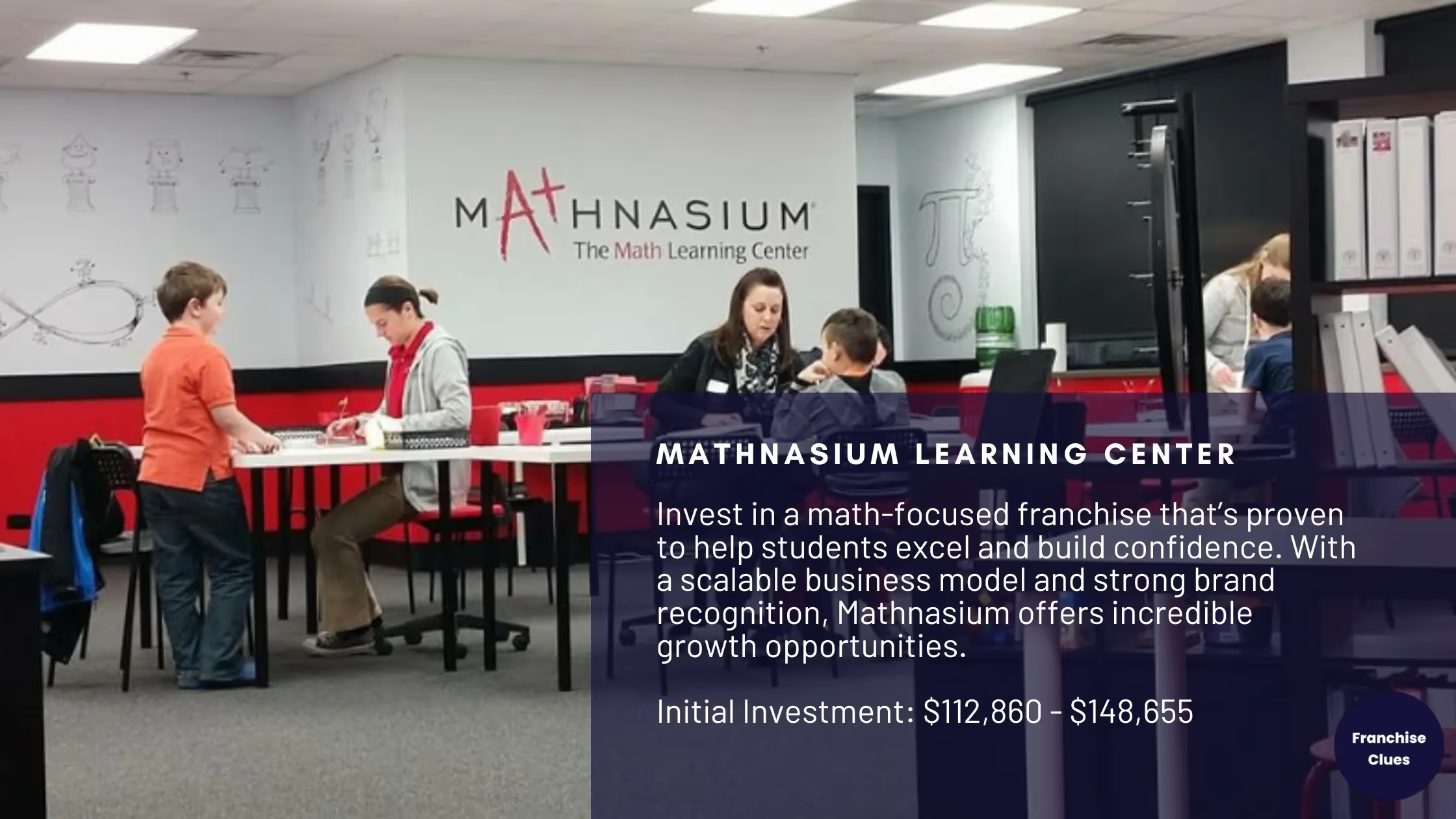
Founded in: 2002
Franchising since: 2003
Franchise units in operation: 1,110
Initial investment range: $94,295 - $138,995
Franchise Fee: $49,000
Royalty: 10%+
Average Revenue Per Unit: $270,836 / unit
Mathnasium provides focused and effective math tutoring with a time-tested, effective teaching method called the Mathnasium Method. These nonprofit organizations generally locate their operations in retail settings, where they keep the hours of operation after school. This helps keep their overhead costs low. The rising need for extra help in education signals a huge profit potential. By 2023, the U.S. market for supplemental education was valued at $20.2 billion, and it grew by 7.1 percent from 2018 to 2023. The top drivers of market growth include increased educational attainment among parents (who then seek more educational support for their children) and the recession-induced budget cuts that have led to a great deal of unfunded mandates for schools. Teaching experience isn't necessary for franchisees, as the company furnishes thorough training on their curriculum and business operations.
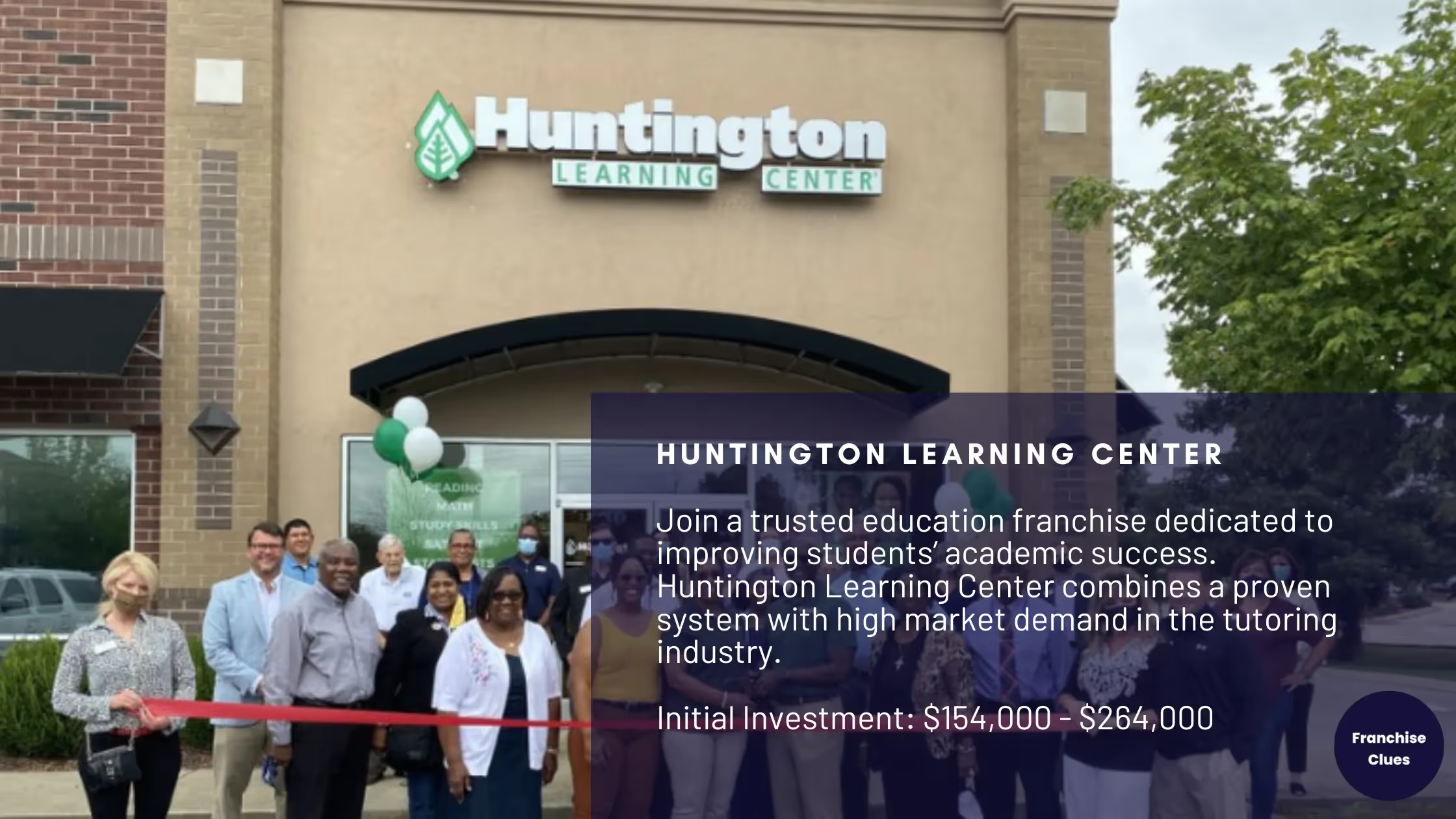
Founded in: 1977
Franchising since: 1985
Franchise units in operation: 286
Initial investment range: $154,063 - $264,028
Franchise Fee: $36,000
Royalty: 9.5%
Average Revenue Per Unit: $479,806 / unit
Huntington supplies K-12 students with what they call "tutoring and test prep services" that are, to the most part, a personalized instruction plan. Their large-scale, almost assembly line, approach to the tutoring business has bled into many other environments in which we "learn," namely our schools and homes. Their secret sauce is: step-by-step instruction. Recall from Part 1 that many of us, even those with considerable wealth, grew up in a time when the step-by-step recipe was the only way we knew to get from the beginning line in our math or writing classes to the "finish" line.
The gym industry is thriving due to a growing emphasis on health and fitness. Franchises in this sector benefit from high market demand and strong brand recognition, offering substantial financial returns for investors. Below are some of the top-performing gym franchises:
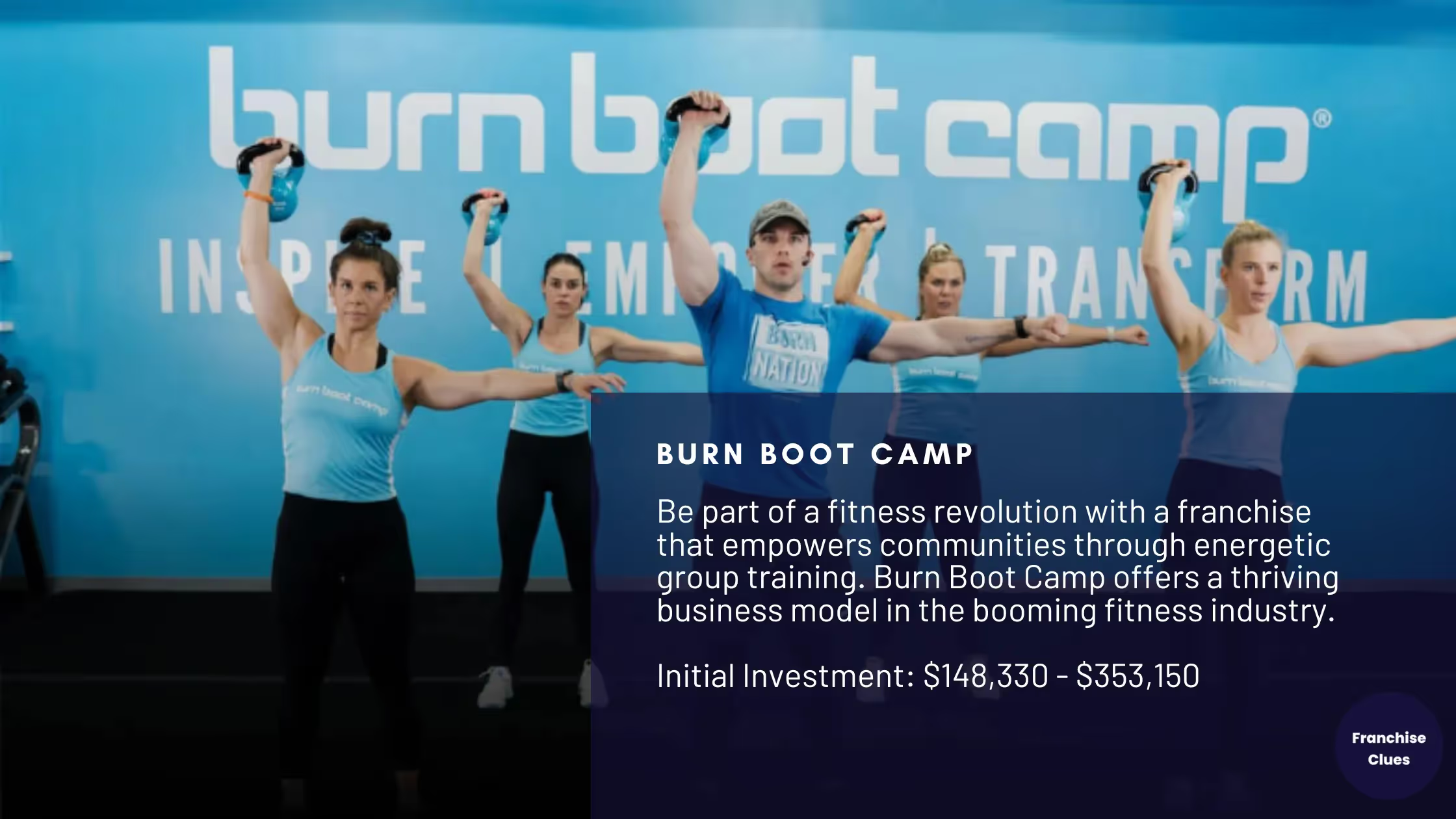
Founded in: 2012
Franchising since: 2015
Franchise units in operation: 339
Initial investment range: $239,225 - $562,979
Franchise Fee: $60,000
Royalty: 6%
Average Revenue Per Unit: $400,526 / unit
The high-intensity workouts of Burn Boot Camp have a primary focus on women, though everyone is welcome. They have built an inclusive, community-centered fitness model that gives rise not only to loyal customers but also to reliable and recurring revenue streams. Burn's franchisees receive comprehensive training at what is affectionately dubbed "Burn University." They also enjoy the benefits of the company's proprietary workout protocols that keep things fresh not just for the members but for the trainers as well (because who wants to be on the same ol' grind day in and day out?).
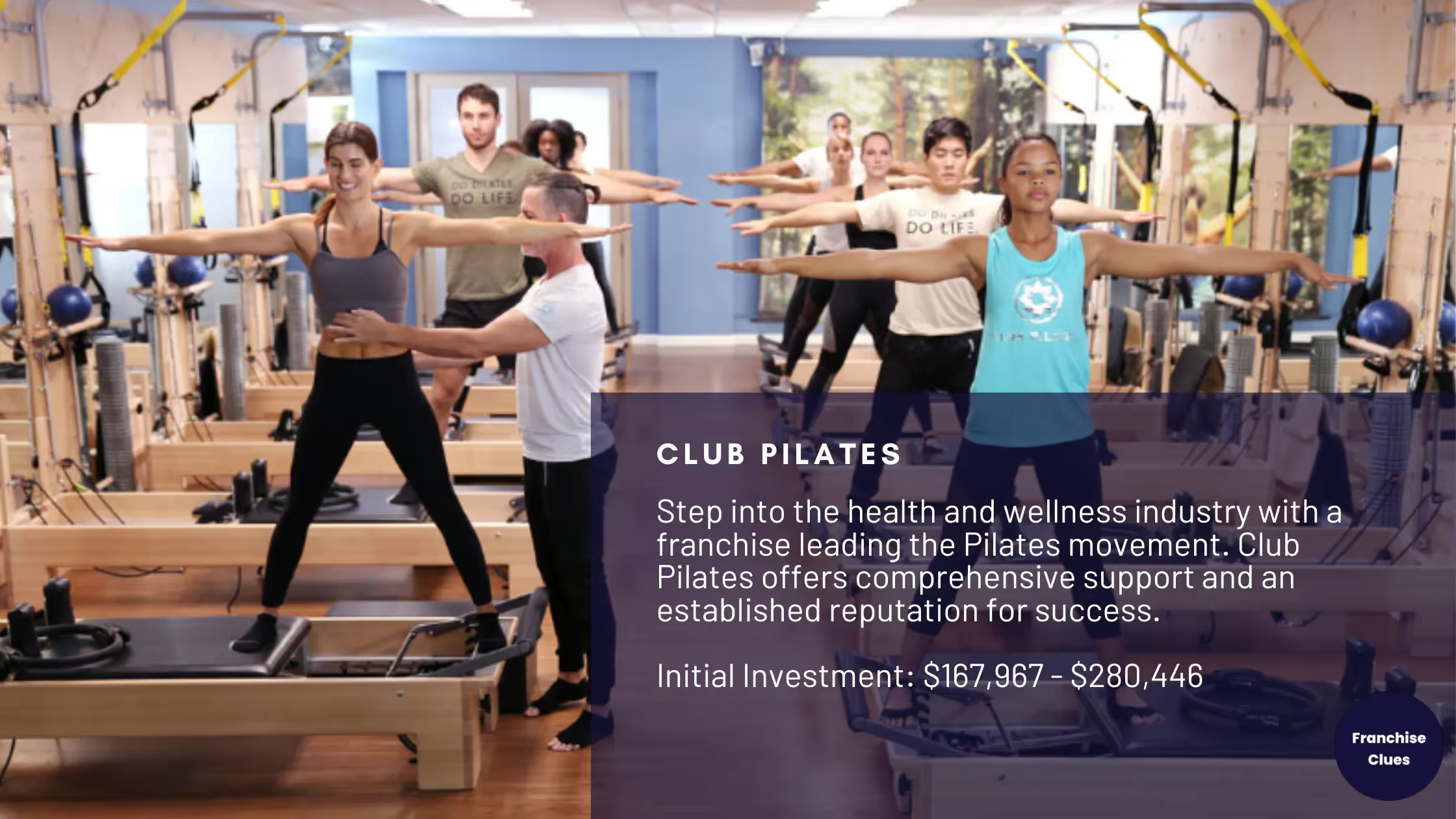
Founded in: 2007
Franchising since: 2015
Franchise units in operation: 899
Initial investment range: $196,525 - $458,575
Franchise Fee: $60,000
Royalty: 8%
Average Revenue Per Unit: $785,306 / unit
Membership-based revenue is predictable, and Pilates classes have an appeal that extends far beyond the types of people likely to take a pole dance or Zumba class. A more classically structured Pilates studio might never see half a dozen people at the same time, even if it offers rarefied experiences at a high price. But a Club Pilates space is likely to see 12, 14, 16, and sometimes 20 people working out in a somewhat cacophonous manner, thanks to the use of loudspeakers, amplifying the instructors' voices. And even then, it's probably a quiet day.
Not only is the somatic experience of being a student in a class at Club Pilates vastly different from that in a more private setting, but there's also the potential for a vastly different profit story—a much better one.
.avif)
Founded in: 2001
Franchising since: 2002
Franchise units in operation: 5,196
Initial investment range: $388,966 - $970,097
Franchise Fee: $25,000 - $42,500
Royalty: $647-$699/mo.
Average Revenue Per Unit: $384,958 / unit
Anytime Fitness is very consistently profitable, and that is because of two basic reasons. The first reason is a 24/7 access model combined with very low staffing. Anytime Fitness locations can be open all the time, and they can be staffed only enough to make the places safe and sanitary. The second reason is that, even with those good reasons to be very profitable, Anytime Fitness charges its members a lot less than most large; health clubs. The average Anytime Fitness membership is right about $38 per month.
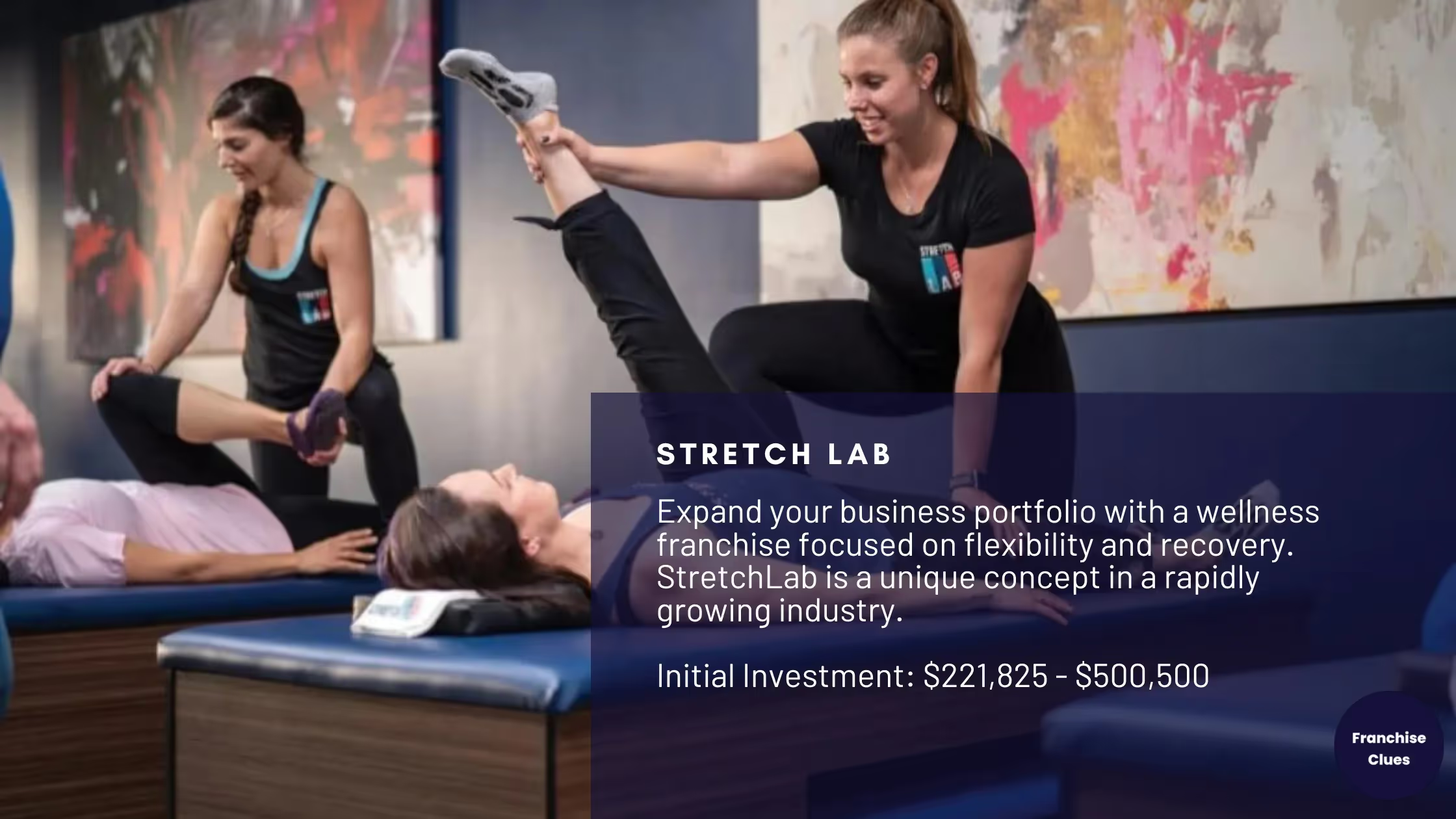
Founded in: 2015
Franchising since: 2017
Franchise units in operation: 410
Initial investment range: $156,200 - $386,100
Franchise Fee: $60,000
Royalty: 18%
Average Revenue Per Unit: $629,248 / unit
Stretch Lab takes full advantage of the burgeoning wellness trend by offering assisted stretching services. These are performed by trained stretch professionals whom the company dubs "Flexologists." Their singular location straddling fitness and wellness allows them to create a complementary business that isn't in direct competition with conventional health clubs. The model based on appointments allows the firm to anticipate the staff it needs during busy times and to see that the revenue flows steadily into the firm. Those who enter the Xponential Fitness system as franchisees receive in-depth training and extensive support. A typical studio only needs 1,000-1,500 square feet to operate, which helps keep overhead costs low. The clientele, however, runs the gamut, from small children to seniors, and all of them are in various states of fitness.
Discover the leading franchises in the massage industry, known for their profitability and market demand. These franchises offer strong brand recognition, proven business models, and exceptional support, making them ideal for investors seeking profitable opportunities in the wellness sector.
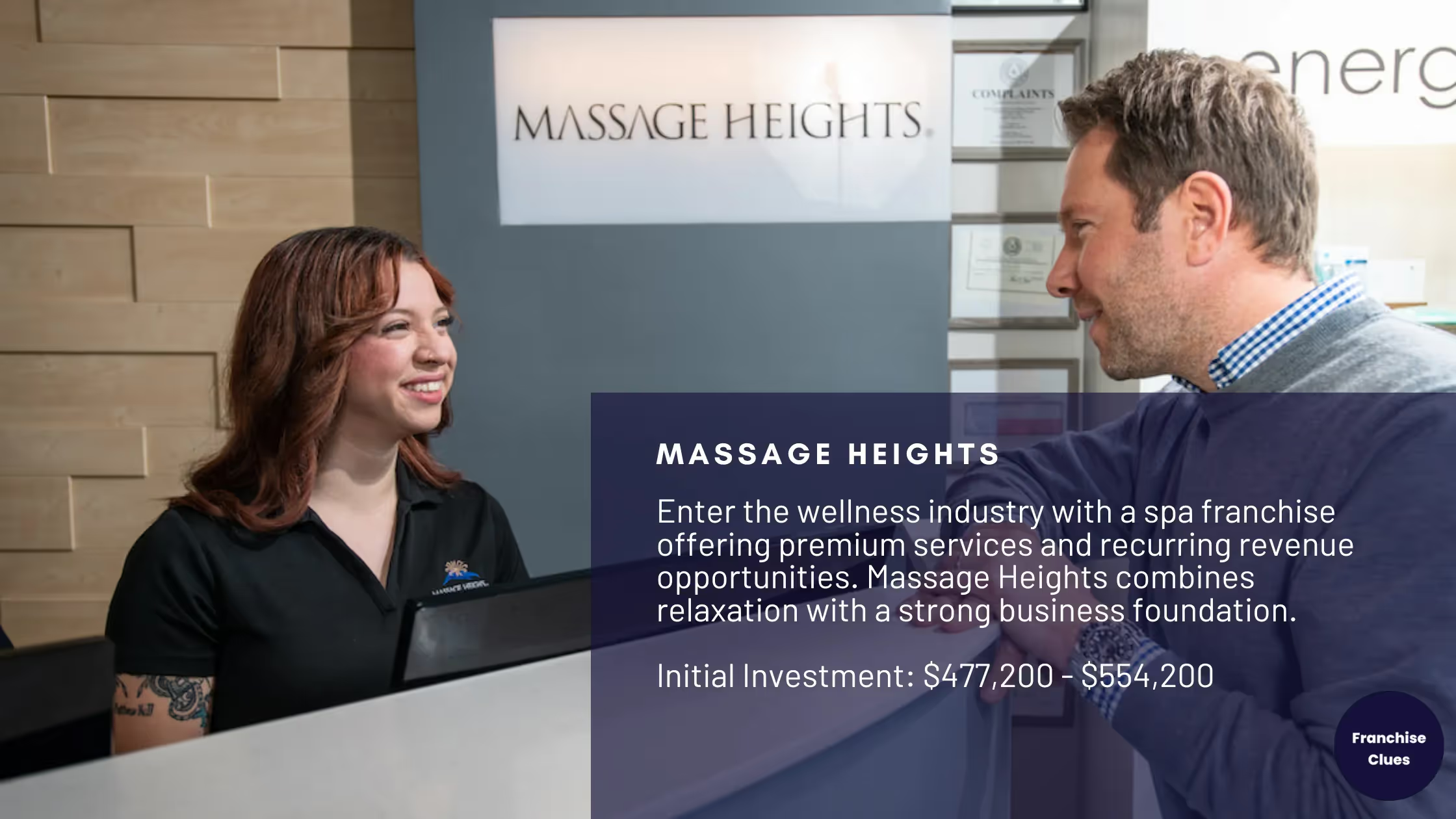
Founded in: 2004
Franchising since: 2005
Franchise units in operation: 112
Initial investment range: $477,200 - $554,200
Franchise Fee: $49,500
Royalty: 6%
Average Revenue Per Unit: $2,954,052 / unit
Therapeutic massage and facial services offered by Massage Heights follow a membership model that allows for a reliable stream of monthly revenue. The premium pricing they command is a direct result of the atmosphere created by their "retreat" concept, which is anything but downscale. Massage Heights University provides detailed training to franchisees and gives continuous support through committed business consultants. The firm offers exclusive products and procedures, along with advanced marketing systems, to fuel the acquisition of new customers. Typically, their sites are in retail centers with strong visibility and pedestrian traffic.
.avif)
Founded in: 2000
Franchising since: 2006
Franchise units in operation: 250
Initial investment range: $322,783 - $517,125
Franchise Fee: $40,000
Royalty: 6%
Average Revenue Per Unit: $789,610 / unit
Elements Massage concentrates solely on therapeutic massage and takes a uniquely personalized approach to each client. Their membership program, the Elements Wellness Program™, not only creates a steady stream of revenue but also helps the franchisees enjoy the stability that comes with knowing that the cash flow is predictable month to month. What distinctly sets this brand apart, however, is that it offers a satisfaction guarantee. If for some reason a client doesn't love the massage they received, the brand makes it right. Another unique selling proposition is that the brand helps match clients with the right therapist.
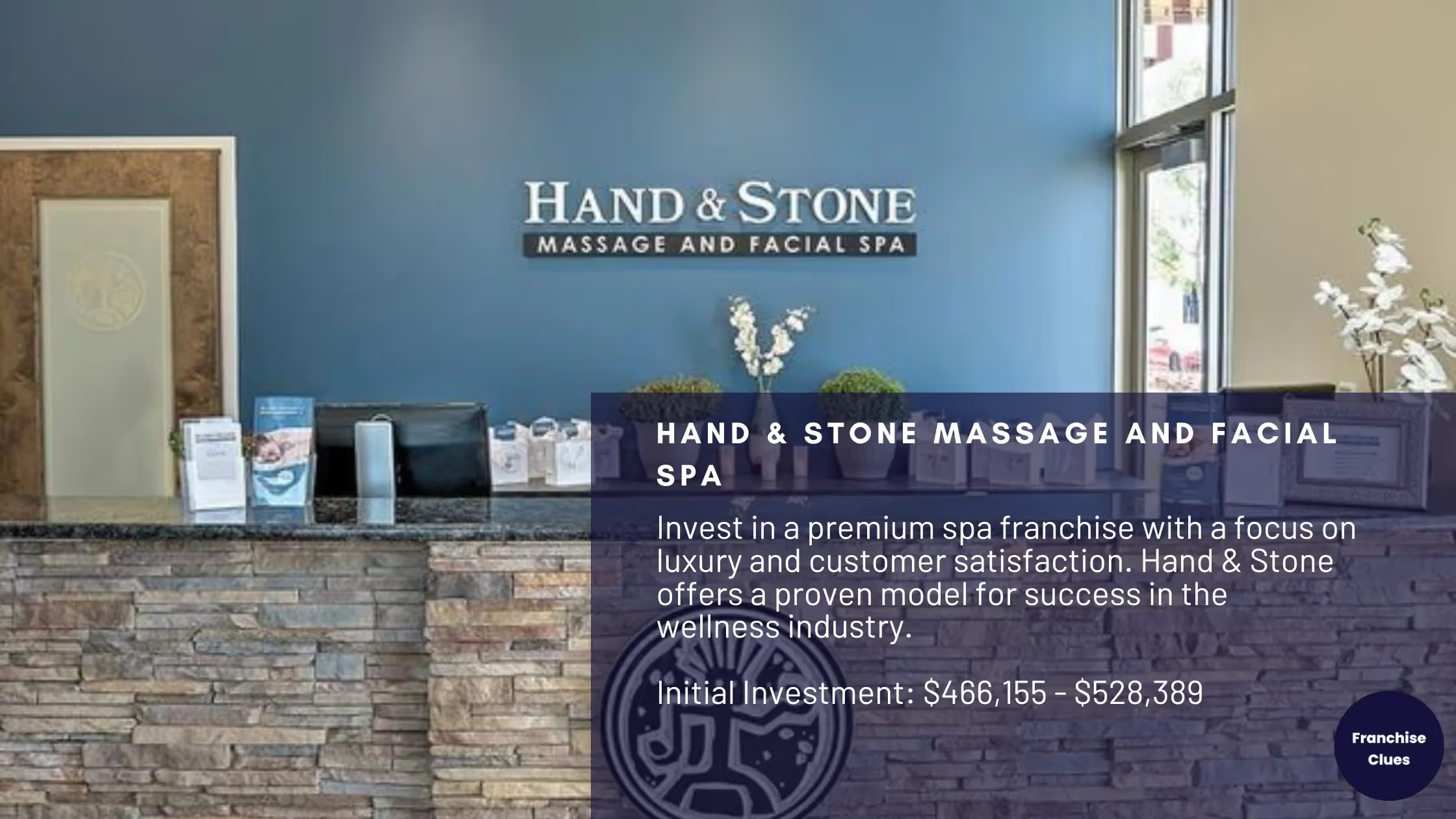
Founded in: 2004
Franchising since: 2006
Franchise units in operation: 544
Initial investment range: $526,791 - $691,311
Franchise Fee: $49,500
Royalty: 5% - 6%
Average Revenue Per Unit: $1,237,714 / unit
The company known as Hand & Stone provides a range of services that center around massage and facial treatments, complemented by a powerful membership model and a well-structured support system. Massage therapists perform several kinds of massages, including the hot stone massage, and estheticians provide facials in a variety of styles, including their most popular treatment, the Classic Facial.
They perform these services in a spa setting that lacks only a high-end retail experience. Beyond that, Hand & Stone's advertised services hardly differ from those of competitors.
.avif)
Founded in: 2002
Franchising since: 2003
Franchise units in operation: 1,083
Initial investment range: $554,850 - $980,000
Franchise Fee: $45,000
Royalty: 6%
Average Revenue Per Unit: $519,921 / unit
Being the foremost massage franchise, Massage Envy has strong brand recognition and a credible business format. They have pioneered making massage accessible and affordable on a services basis, using a membership model that has proven very effective. Franchisees, then, work under a well-known name with a solid operating system and quite a lot of visibility. As part of a national ad campaign, their local studio gets ads that help drive business. As a part of almost any successful massage studio, equipment and supplies play a large role, which is no different in a Massage Envy franchise. By virtue of being part of a large franchise, these studio owners have a purchasing power that smaller studios do not.

Founded in: 2007
Franchising since: 2014
Franchise units in operation: 44
Initial investment range: $104,625 - $220,279
Franchise Fee: $40,000
Royalty: 7%
Average Revenue Per Unit: $280,306 / unit
Keyrenter offers property managementKeyrenter provides a suite of property management services that net the company revenues from multiple streams. These include tenant placement, ongoing property management, and maintenance coordination. Their unique software system makes things easier, and us more efficient. Comprehensive training, ongoing support, and proven marketing systems that attract both property owners and tenants are benefits franchisees receive. The franchise business model permits scalable growth as franchisees manage an increasing number of properties. A low overhead business model does not require a retail location, which helps keep startup costs manageable. services with multiple revenue streams including tenant placement, ongoing management, and maintenance coordination. Their proprietary software system streamlines operations and improves efficiency. Franchisees benefit from comprehensive training, ongoing support, and proven marketing systems to attract both property owners and tenants. The business model allows for scalable growth as franchisees add properties under management. Their low overhead model doesn't require a retail location, keeping startup costs manageable.

Founded in: 1986
Franchising since: 1994
Franchise units in operation: 51
Initial investment range: $77,400 - $119,500
Franchise Fee: $49,900
Royalty: 10%
Average Revenue Per Unit: $395,741 / unit
Showhomes offers diversified home staging services, including vacant home staging and occupied home makeovers. Their unique program, featuring the Home Manager, has residents living in the staged spaces—while maintaining the homes—prior to sale. This novel method decreases expenditures for merchants and simultaneously offers franchisees several profit streams. You can run the business from home at first, which will keep your overhead very low. Comprehensive training in staging techniques, business operations, and proprietary systems is given to franchisees.

Founded in: 2009
Franchising since: 2019
Franchise units in operation: 52
Initial investment range: $37,900 - $169,750
Franchise Fee: $19,000 - $109,000
Royalty: 8%
Average Revenue Per Unit: $3,583,326 / unit
Grand Welcome takes full advantage of the burgeoning business of managing vacation rentals to provide a suite of services so complete that it almost seems, at first glance, too good to be true. This suite includes all the key components needed to effectively manage a short-term rental: not just the key and the door, but also a well-stocked house, a good housekeeper, a genial front-desk manager, and a homeowner's association that protects both the owner and the guest. Their technology foundation consolidates operations and enhances the visitor experience. Franchisees gain from marketing on a national scale, and from an overall training and support regime that is both comprehensive and instructive. The business model permits considerable scaling as additional properties come under management. High-end properties and extraordinary guest experiences enable them to charge premium management fees.
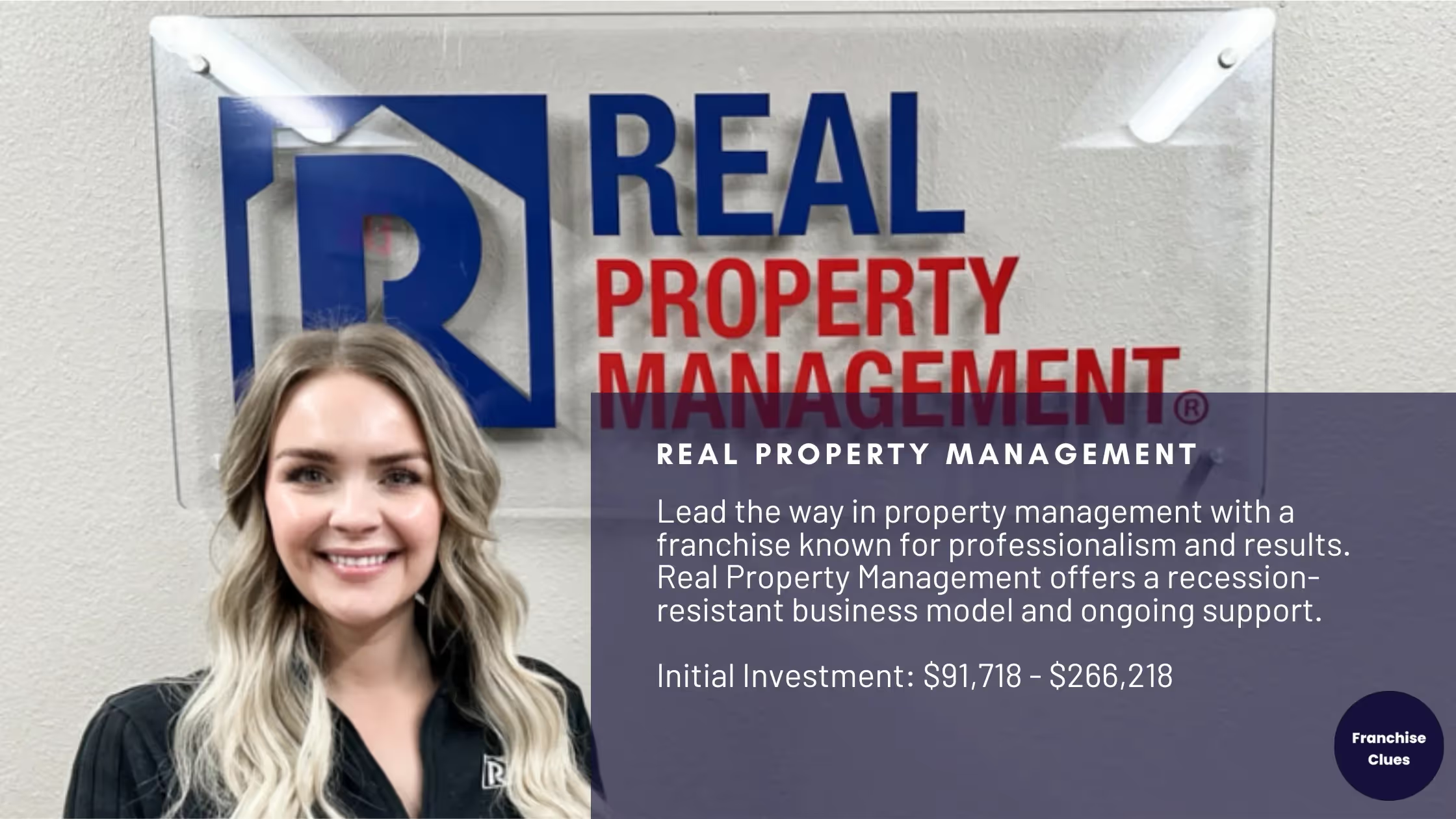
Founded in: 1986
Franchising since: 2004
Franchise units in operation: 438
Initial investment range: $91,718 - $266,218
Franchise Fee: $59,900
Royalty: 7%
Average Revenue Per Unit: $881,691 / unit
Residential property management is what RPM does, and it does it well. With a sophisticated support system and the kind of far-reaching services one expects from a national firm, RPM has its trained personnel find and screen tenants, collect rents, and handle all kinds of maintenance, from changing light switches to getting a roof repaired. Franchisees reap the benefits of RPM's national marketing and get an impressive amount of training before they're let loose in their territories. If you manage to grab a hold of a property, it tends to stick with you for quite a while.
Uncover the top franchises in the home care industry that offer exceptional profitability and growing demand. These franchises are distinguished by their reliable support systems, well-known brands, and successful business frameworks, making them excellent choices for investors aiming to tap into the expanding home care market.
.avif)
Founded in: 1991
Franchising since: 2002
Franchise units in operation: 55
Initial investment range: $116,874 - $176,116
Franchise Fee: $49,000
Royalty: 5%
Average Revenue Per Unit: $789,230 / unit
Caring Senior Service delivers home care that is not medical in nature. Yet the population it serves is old, and that is the very demography that is driving growth in home care. When looked at purely from the perspective of age, the older a person is, the more likely they are to need some form of assistance, and this has always been the case. Our exclusive 'GreatCare' process guarantees steady, excellent service delivery. Comprehensive training, ongoing support, and scheduling and billing systems that are as sophisticated as those of any large company in America—these are the benefits of owning a franchise. But are they benefits really? Because, honestly, what woman in business today in America can’t have those things and still reach the level of success that somehow got us to the point where we’re writing and reading this book? And when we say reach the level of success, we mean in terms of revenue and profits, not by some other, less tangible or quantifiable means. The company concentrates on technology, such as its "Tendio" platform, which betters the matching and communication of clients and caregivers. Their business model allows for scaling as more caregivers are added to meet increasing demand.
.avif)
Founded in: 1995
Franchising since: 2000
Franchise units in operation: 716
Initial investment range: $88,719 - $157,669
Franchise Fee: $49,500
Royalty: 5%
Average Revenue Per Unit: $1,969,687 / unit
Right at Home offers comprehensive senior care services with strong brand recognition. Their exclusive RightCare system assures consistent service delivery and quality control. At Right at Home University, franchisees undergo thorough training and then benefit from continuous support in the field. The firm offers advanced marketing systems, operational support, and exclusive management software. They concentrate mainly on retaining caregivers, which reduces turnover and thereby helps maintain the quality of services. The scaling potential is considerable as we grow our client base.
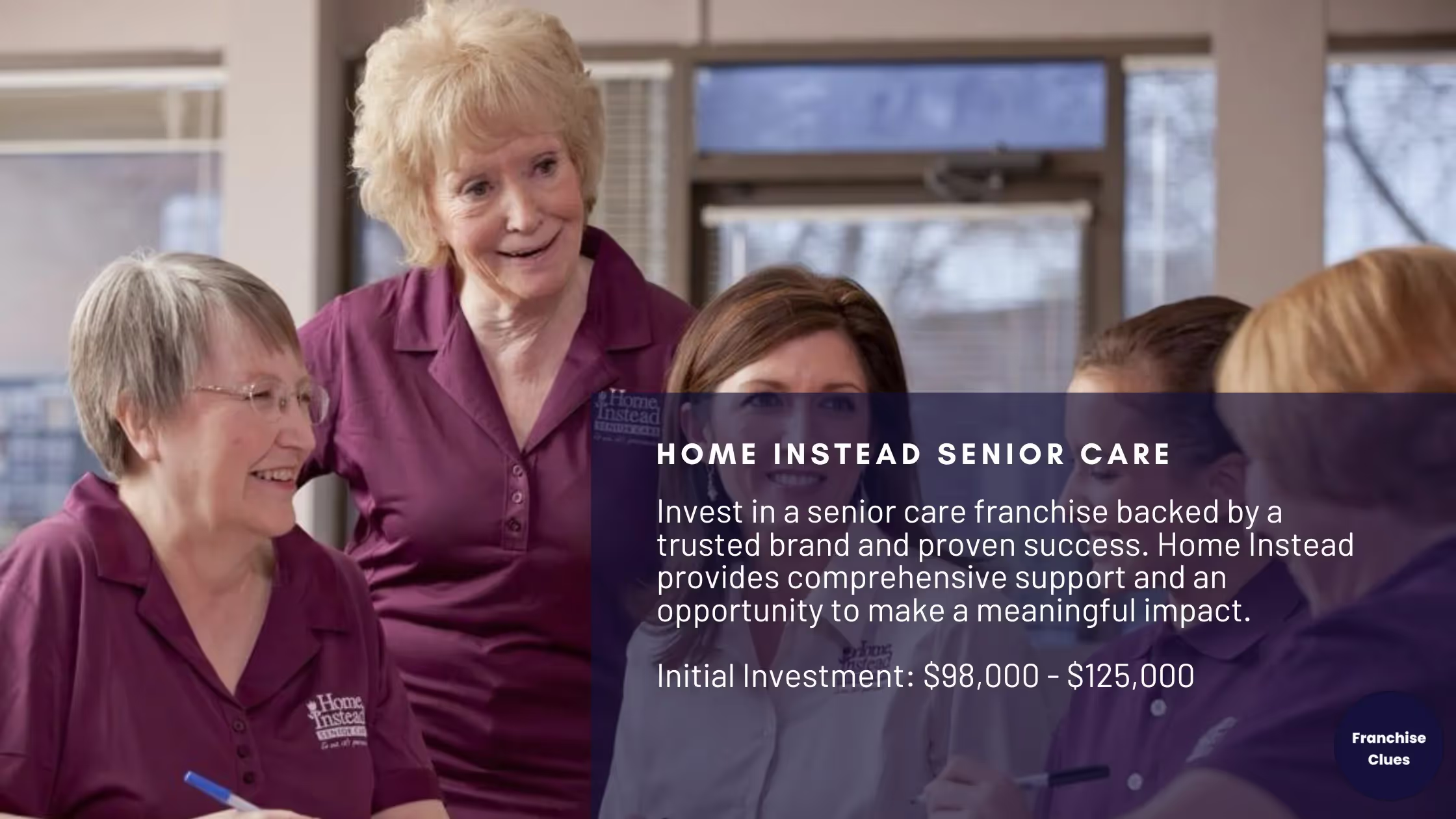
Founded in: 2007
Franchising since: 2012
Franchise units in operation: 3
Initial investment range: $56,510 - $152,550
Franchise Fee: $30,000
Royalty: 5%
Average Revenue Per Unit: $2,229,480 / unit
Home Instead is a market leader with stellar systems of training and support. Their comprehensive approach includes not only personalized care plans but also the careful matching of head-to-head candidates for the positions of caregiver and care recipient. Franchisees benefit from not one, but two, large systems of support: the Home Instead system and the operation system of the franchise itself. These systems are set up by a very large company, which has perfected the large business model that serves its shareholders well.
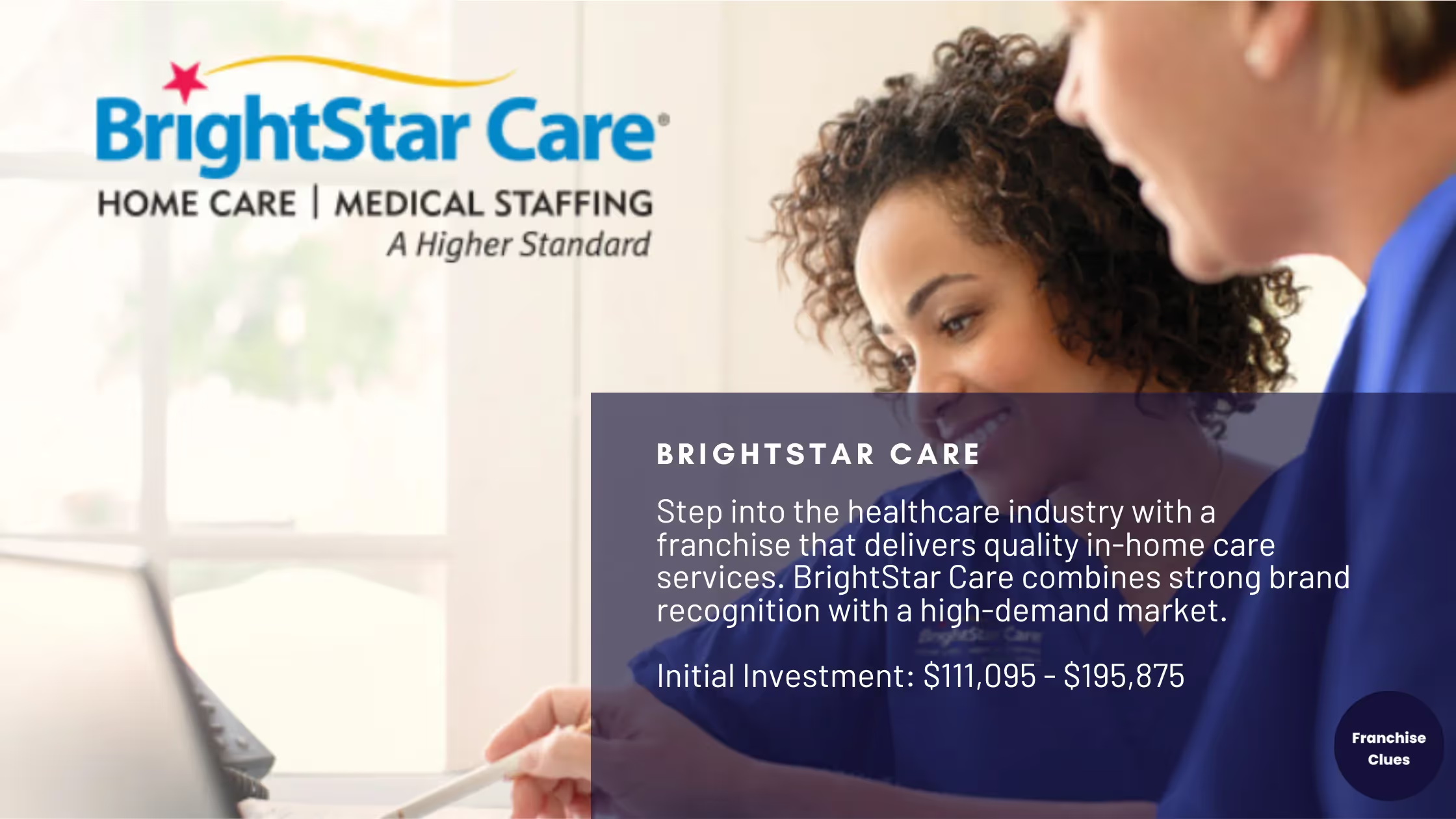
Founded in: 2002
Franchising since: 2005
Franchise units in operation: 373
Initial investment range: $111,095 - $195,875
Franchise Fee: $50,000
Royalty: 5.25%
Average Revenue Per Unit: $1,781,764 / unit
BrightStar Care provides revenue-sustaining medical and non-medical home care services. Their significant market differentiator is the provision of higher-acuity home care under the supervision of registered nurses. Franchisees secure a steady stream of referrals to their BrightStar Care business because they have earned (and behave) in ways that justify (and make us want to have) accreditations from the Joint Commission. They behave this way because the parent company provides them with training, systems (both technological and operational), and support that are second to none.
Discover the most profitable franchises in the medical franchise industry, known for their high earnings and consistent demand. These franchises stand out with their comprehensive support, reputable brands, and proven business strategies, making them ideal for investors seeking profitable opportunities in the medical field.
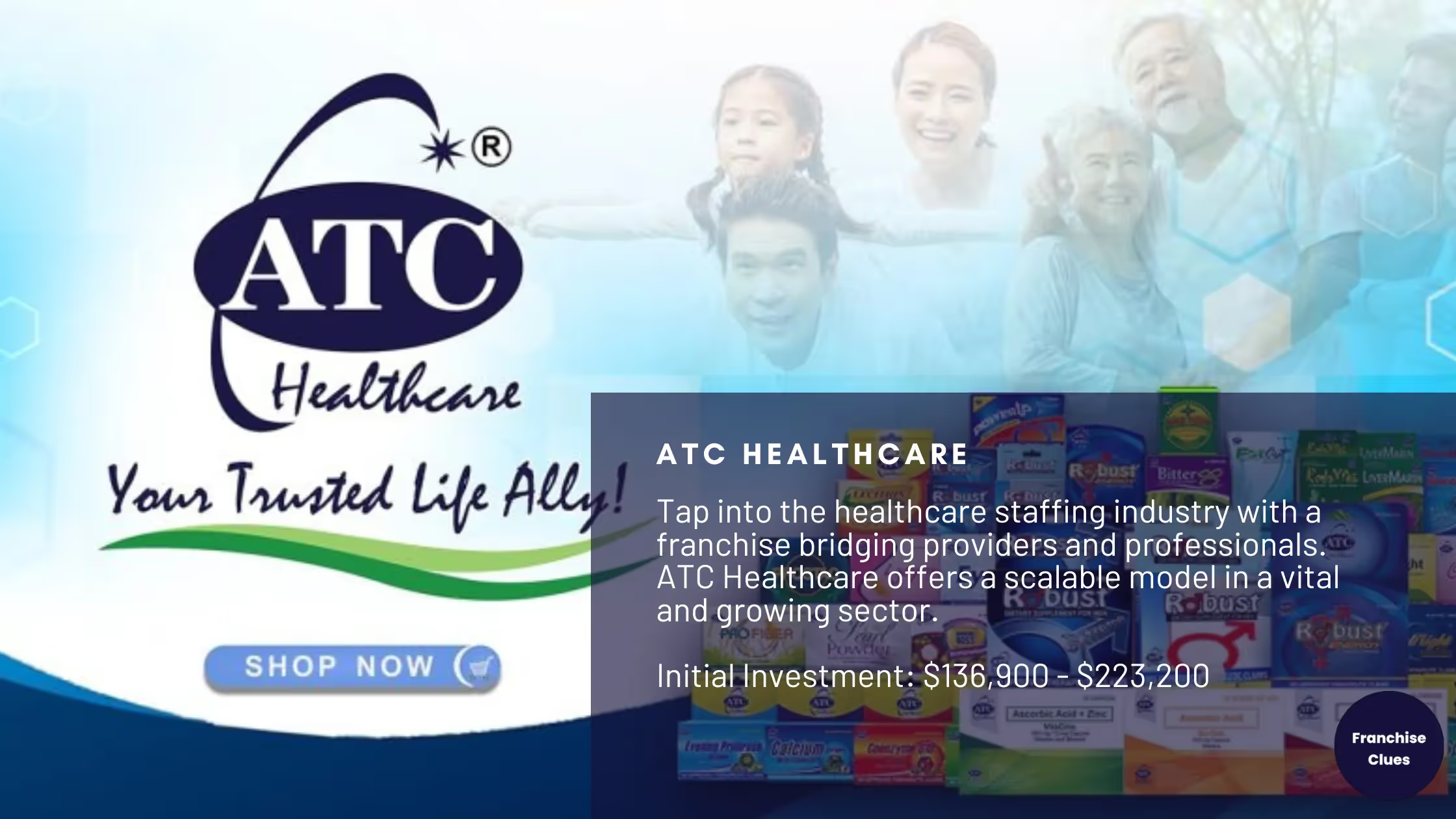
Founded in: 1985
Franchising since: 1996
Franchise units in operation: 66
Initial investment range: $128,700 - $209,500
Franchise Fee: $50,000
Royalty: Varies
Average Revenue Per Unit: $5,199,684 / unit
ATC Healthcare gives the high-revenue potential medical staffing services. They comprehensively recruit, credential, and place healthcare professionals in hospitals, clinics, and long-term care facilities. Franchisees benefit from proprietary software systems, comprehensive training, and family-like support. The business model allows for revenue recurrence, as healthcare facilities have to use staffing services on nice days and not-so-nice days. Their focus on quality and compliance helps them secure contracts with major healthcare providers.
.avif)
Founded in: 1998
Franchising since: 2005
Franchise units in operation: 117
Initial investment range: $103,900 - $308,750
Franchise Fee: $54,500
Royalty: 7%
Average Revenue Per Unit: $280,547 / unit
ARCpoint Labs provides services that span the diagnostic testing spectrum, including not just drug and clinical lab tests but also DNA tests and wellness screenings for companies. That range allows the lab to tap into several different markets and serve both individuals and businesses, which benefits franchisees by giving them more avenues for reaching potential customers. Adding to that, the proprietary systems and ongoing support that franchisees get help them make the most of all these opportunities. And because ARCpoint quickly pivoted to offering COVID-19 tests when that became a main health concern, its model also demonstrates adaptability. Still, the lab's core focus is on accuracy and compliance.
.avif)
Founded in: 1999
Franchising since: 2003
Franchise units in operation: 897
Initial investment range: $215,297 - $478,997
Franchise Fee: $39,900
Royalty: 7%
Average Revenue Per Unit: $488,771 / unit
The Joint is a chiropractic clinic with a membership model. It generates recurring revenues, and it does so largely because its operational model is simple. Patients do not need to make an appointment before seeing a chiropractic doctor. They do not need to show insurance documents either. They just pay a little bit of money (or not) and then proceed with the chiropractic adjustment. From a business perspective, this is a straightforward model. It does not handle cases with elaborate clinic procedures. The Joint doesn't need to do that, because its clinic is not an elaborate business; it is a simple one that provides simple services to simple people.
The Joint has a clinical footprint that is roughly half the size of its nearest comparable competitor. It performs well on a metric called turnover, which is the number of patients seen in a clinic in one day. It does that because patients can walk into a clinic and see a doctor without much preamble.
The coffee industry continues to flourish as coffee remains a beloved beverage worldwide. Franchises in this sector benefit from loyal customer bases and consistent demand. Here are some of the top-performing coffee franchises:
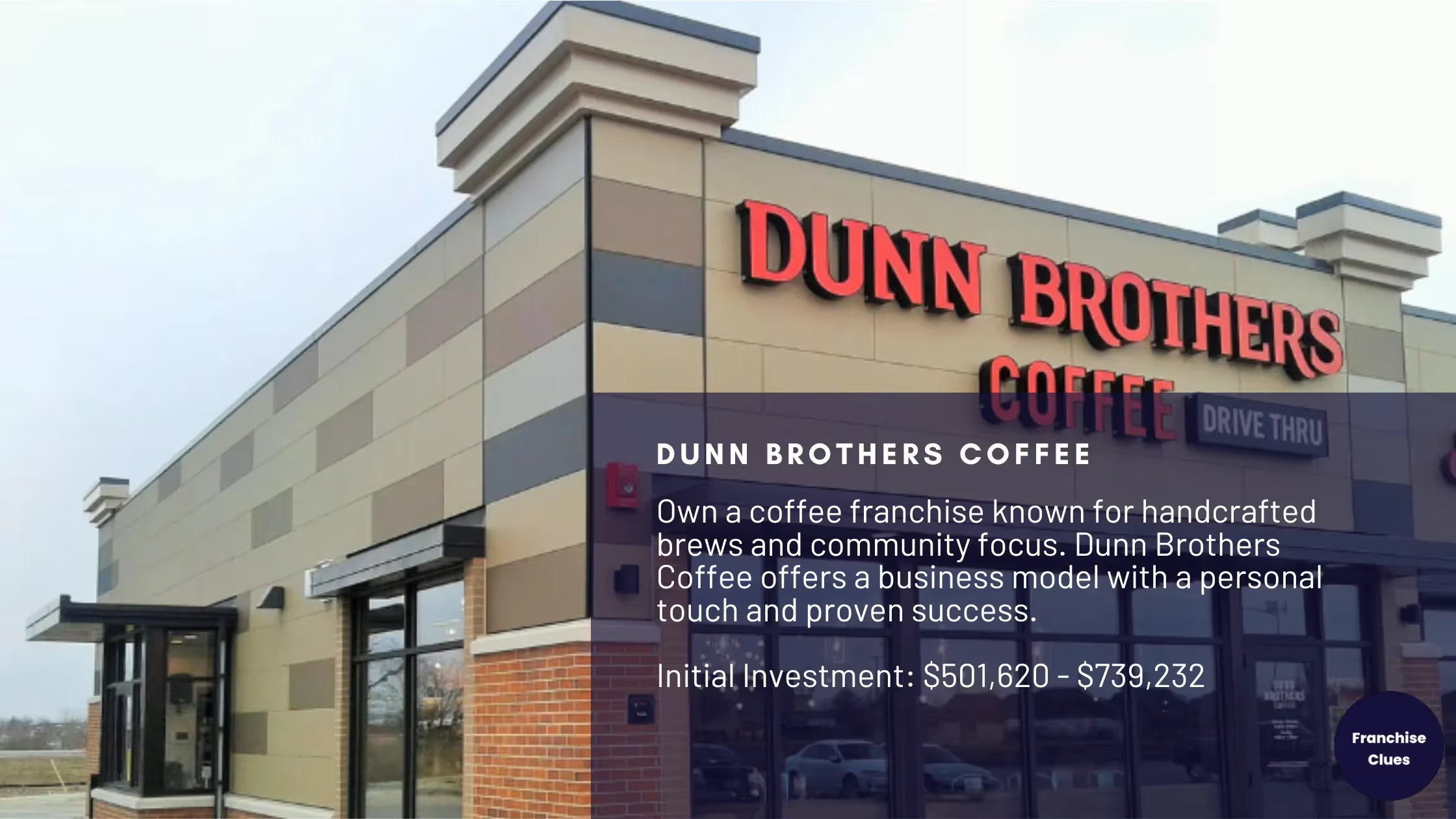
Founded in: 1987
Franchising since: 1994
Franchise units in operation: 68
Initial investment range: $396,000 - $590,393
Franchise Fee: $37,500
Royalty: 5%
Average Revenue Per Unit: $619,486 / unit
Dunn Brothers specializes in coffee and excellent customer service. Their in-store roasting creates a unique experience—"It's hard not to love the aroma of roasting coffee!" Franchisees and their are comprehensively and intensively trained. They learn to uphold and maintain the company’s standards in quality and environmental sustainability.
.avif)
Founded in: 1991
Franchising since: 1998
Franchise units in operation: 33
Initial investment range: $454,200 - $920,500
Franchise Fee: $40,000 - $100,000
Royalty: 5%
Average Revenue Per Unit: $432,747 / unit
This coffee franchise with a Hawaiian theme has strong brand identification and offers unusual products. They sell Hawaiian coffees and tropical, fancy drinks; this puts them in a distinct market position. They offer several different store formats, including drive-thrus. Their business model has quite a bit of flexibility, allowing for many adaptations to local markets while retaining the overall Hawaiian theme.
Franchisees receive excellent training and continued support, and they work with proprietary recipes. The revenue streams are varied enough, and the volume potentials large enough, that I consider them a strong investment.
.avif)
Founded in: 1963
Franchising since: 2002
Franchise units in operation: 1,035
Initial investment range: $250,000-$500,000
Franchise Fee: $30,000-$50,000
Royalty: 5.5%
Average Revenue Per Unit: $926,248 / unit
The Coffee Bean melds coffee and tea with a world-class brand. Founded in 1963, it was brewing up the quite-special bowl of Joe long before the bean counters at Starbucks were counting any beans. And within The Coffee Bean's quite diverse offerings, it counts several quite profitable income streams. Fledgling franchisees receive comprehensive training in operations and systems at the quite warm and hospitable headquarters in Los Angeles. The quite global reach of the brand provides recognition that drives customer traffic.
.avif)
Founded in: 1998
Franchising since: 2002
Franchise units in operation: 170
Initial investment range: $562,390 - $1,290,931
Franchise Fee: $30,000
Royalty: N/A
Average Revenue Per Unit: $828,448 / unit
The Human Bean has a drive-thru model that serves as a direct-to-consumer interface and offers the kind of convenience and customer service that is virtually required in today’s fast-paced society. The overhead costs are lower than what a sit-down restaurant requires. The costs for the real estate, the utilities, and the maintenance are lower, and these kinds of direct-to-consumer models can operate at a lower cost structure than a model that involves a consumer walking into an establishment. And the Human Bean very effectively beats the street on that score in terms of serving good coffee.
.avif)
Founded in: 1992
Franchising since: 1994
Franchise units in operation: 143
Initial investment range: $55,400 - $59,500
Franchise Fee: $45,000
Royalty: 5% - 3%
Average Revenue Per Unit: $153,543 / unit
Dentist's Choice fixes dental equipment with low overhead and specialized service. This niche business provides essential services to dental practices, mending handpieces at a fraction of the cost of replacements. Franchisees can start the business at home and keep overhead minimal. The company provides comprehensive training, and you don't need experience in dental equipment repair to succeed. Their business model features exclusive territories, so you're not competing with other franchisees, and recurring revenue: dental practices need tunes ups for their equipment just like you do for your car. The investment is low, and the potential return is high because the margin on repairs is close to 100 percent.
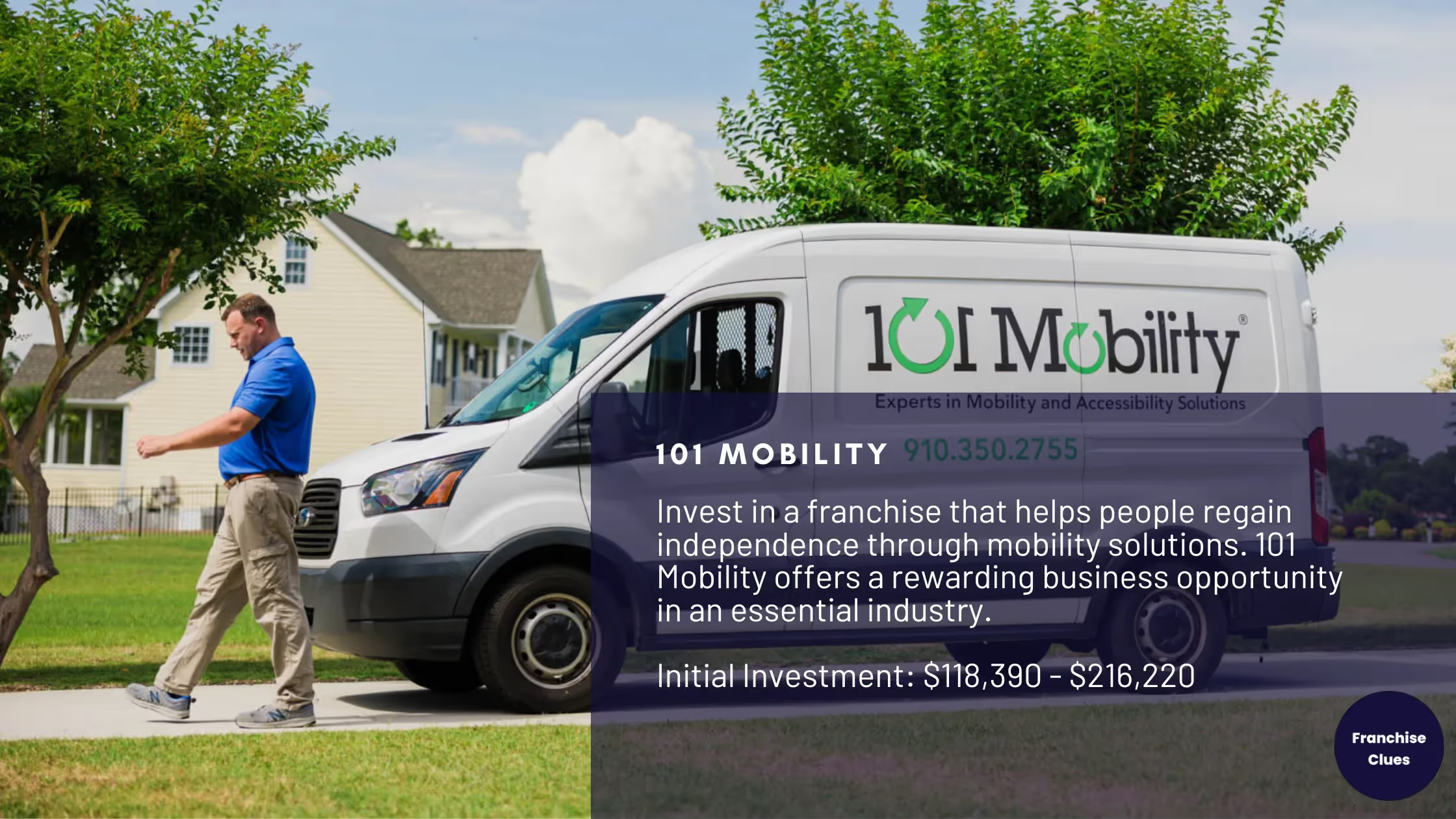
Founded in: 2008
Franchising since: 2010
Franchise units in operation: 196
Initial investment range: $120,790 - $218,620
Franchise Fee: $35,000 - $60,000
Royalty: 5% - 7%
Average Revenue Per Unit: $663,504 / unit
Number of Locations: 80+ locations nationwide
101 Mobility delivers accessibility solutions to a market that is increasingly demanding them. Their product line includes stairlifts, wheelchair ramps, platform lifts, and other mobility equipment for both residential and commercial applications. They offer these products through a growing network of franchisees, who benefit from relationships with multiple manufacturers and can thus provide tailored solutions to each customer's needs. The company supports its franchisees with comprehensive training, marketing, and operational assistance. Their business model, which encompasses both product sales and service contracts, creates multiple revenue streams.
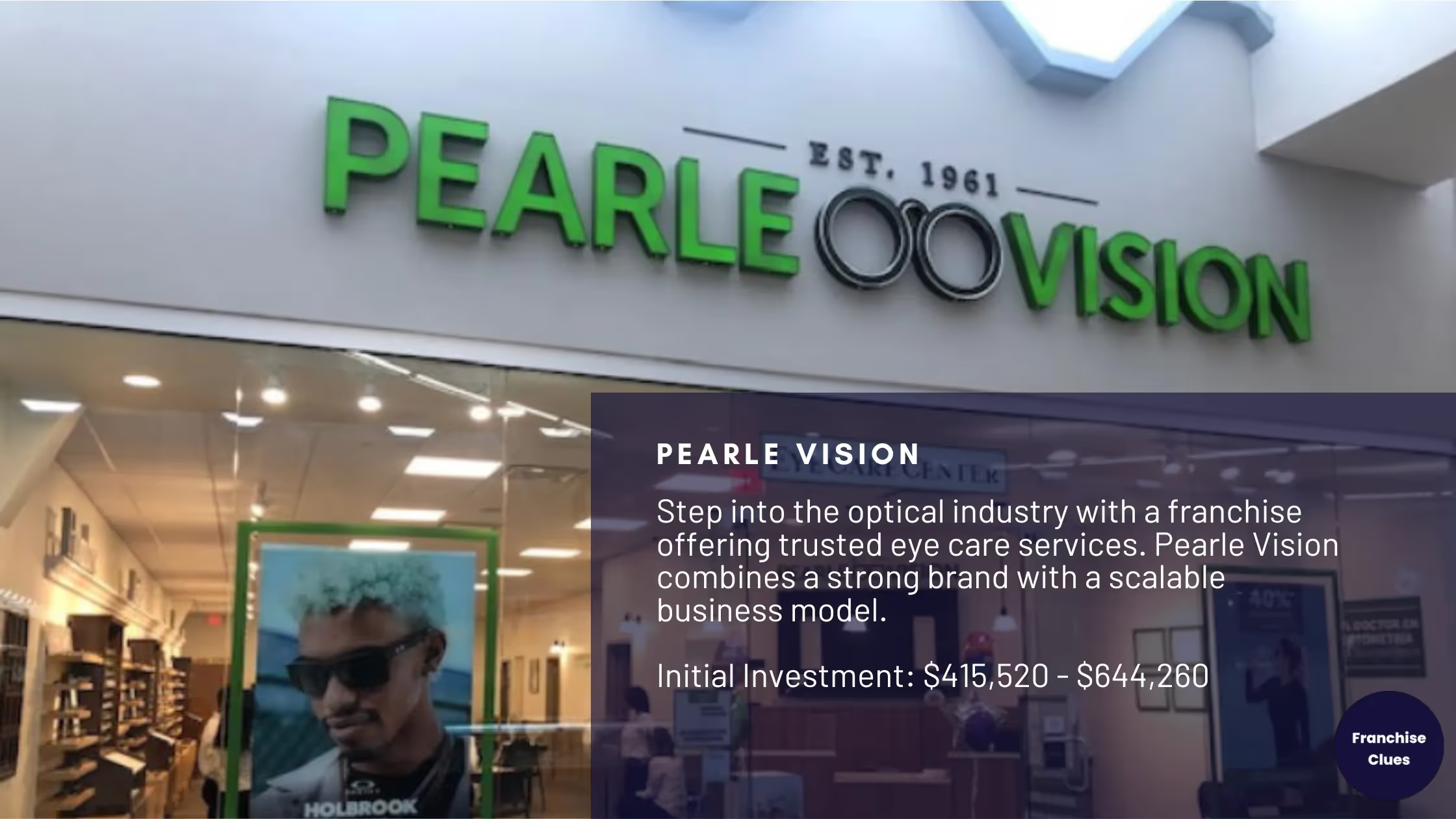
Founded in: 1961
Franchising since: 1980
Franchise units in operation: 570
Initial investment range: $70,195 - $990,710
Franchise Fee: $30,000
Royalty: 7%
Average Revenue Per Unit: $1,011,500 / unit
Pearle Vision has a strong brand presence and has been around since 1961, offering optical products and services. They position themselves as providing "neighborhood eye care," personal service that sets them apart from big-box optical retailers. Their franchisees benefit from a well-honed system of both pre-opening and ongoing training, a marketing program that is both sophisticated and comprehensive, and probably better than average supply chain pricing on frames and lenses. What you get with Pearle Vision, in other words, is a level of service and a group of people who actually do care about your vision and the appearance of your vision, as well as the appearance of the eyewear itself.
A franchise's success can be greatly influenced by its location. Retail business concepts tend to perform well in high-traffic, highly visible locations. Service-based franchise businesses, on the other hand, can thrive in lower-cost spaces with good accessibility. A bit less certain, but equally important, is the demographic fit between the local population and the franchise's target customer. To counteract any potential poor choices, many franchisors provide their new franchisees with assistance in site selection that is not only smart but also kind of high-tech.
Keeping expenses down and quality high is the surest path to maximum profitability. This means careful, expert control of not just obvious direct costs like supplies and labor, but also many indirect costs that are easy to overlook—like excessive energy use, for instance. Some franchisors (Pizza Hut, for instance) offer franchisees highly developed operating systems and software to help them optimize just this sort of thing.
Effective marketing is absolutely essential to the best franchise concept when it comes to not just acquiring customers, but keeping them, too. Most franchisors (not all, unfortunately) supply their franchisees with effective marketing materials and strategies—but the way these materials and strategies are deployed, and the extent to which franchisees engage their communities, tend to determine just how effectively the marketing drives customer acquisition.
Within this context, online and digital marketing have become vitally important for franchises. Franchisees who actively and diligently manage their online reputations (i.e., the way they appear to the public in the virtual sphere) typically enjoy much more substantial virtual traffic that generates real-world foot traffic and sales.
Numerous profitable franchisees run several units. This allows them to achieve something akin to economies of scale in management, marketing, and purchasing. Each unit still needs its own operating personnel, but the number of such personnel among several units doesn't increase in direct proportion to the number of units being served. The same number of administrative personnel can manage several units as well as it can manage one.
The Small Business Administration provides loan programs intended exclusively for buying franchises. SBA 7(a) loans can cover as much as 85% of the project cost, and they come with repayment terms that are longer than those of typical loans. Most franchisors are listed on the SBA Franchise Directory; this directory helps streamline the approval process.
Financing from a conventional bank usually necessitates a better credit profile and a heftier down payment than does an SBA loan, but the banks often come in with pretty competitive interest rates. If you are looking to fund a franchise of a well-established brand with a strong performance record, your chances of getting conventional financing are pretty good.
Some franchisors provide direct financing or partnerships with preferred lenders. These arrangements can sometimes offer more favorable terms due to the franchisor's confidence in their business model.
This strategy permits potential franchise owners to fund their businesses using pre-tax retirement money. This way, franchisees can access substantial amounts of capital without going into debt, thus allowing them to start their ventures on a relatively firm financial footing. Once again, however, this path to franchise ownership is not for the faint of heart.Investor PartnershipsHaving partners can diminish the necessity of raising a lot of capital. But it also means you have to share the business with someone else, which often leads to the need for using operating agreements—all the more reason to keep lawyers in business. Brush up on your knowledge of clear agreements defining roles, responsibilities, and profit distribution.
In addition to going over the FDD, talk to several current and past franchisees about their experiences. When you converse with them, get into the nitty-gritty details about profit and loss. Find out how much support the franchisees really get and how many lifelines they have to toss each other when things go south. And challenges? Oh, they have plenty. Every franchisee I've ever encountered has a laundry list of complaints and obstacles, and if you ask nicely, they may even hand you a copy.
For someone else, the most profitable franchise might not be the best fit. When considering opportunities, think about your skills, experience, and interests. Envy and aptitude for the business will have a—what's the word?—impact on your success.
A frequent cause of business failure is not having enough startup capital. If you set out to start a business, you must have enough cash available to pay for the concept to get it to the point where it can stand on its own—that is, to pay operating expenses until the business itself starts earning a profit. For most businesses, that takes several months, and even more for some. The key here is having enough money in the bank for enough months to cover enough expenses.
The key benefit of franchising is that it offers a tried-and-true system. You can look elsewhere for models that are more or less proven but, when it comes to systems that work, franchising is among the top echelon. The very essence of franchising is that it offers a business model that is supposed to work—that it is essentially a business in a box.
All these franchises are great investments and certainly offer profitability. But before you fork over any cash, don’t just dive in. That would be a franchise foul. Instead, do your due diligence. Look into each franchise and speak with current franchisees. Also, consult with financial and legal advisors to make sure this investment is right for you.
Are you still feeling inundated with all the franchise choices? At Franchise Clues, we provide no-cost, individualized franchise consulting to help you find your ideal opportunity based on your finances, talents, and aspirations.
Our professionals will assist you.
Go to Franchise Clues today to begin the journey of owning a franchise, with expert direction every step of the way. Our service is entirely complimentary, and we are resolute in our commitment to helping you discover the franchise that's right for you—not just any franchise.
Each of these franchises is a great place to invest and has been shown to make money. But before you buy in, do your homework: Look into the franchise itself, interview people who are running the franchise in your area, and talk to a couple of people who have invested in other locations. And also—this one's really important—make sure to consult both a financial and a legal advisor. That way, if you do invest, you'll know you're making a sound decision.
All factors in our franchise reviews are scored on a scale from 0 to 10, which includes 11 possible scores. We only assign a score of 0 if a franchise completely lacks a crucial feature. If a franchise shows any level of functionality related to the evaluated factor, we avoid giving a score of 0.
The 5 factors reviewed are weighted based on an overall total of 100%:
Our scoring methodology is meticulously designed to ensure a fair, comprehensive evaluation of each franchise based on specific criteria relevant to their industry and operational model. Here’s a breakdown of how we approach the assessment for each factor:
Each factor is scored independently based on data collected from credible sources, including industry reports, franchise disclosure documents, and direct communications with franchisors. Scores are then reviewed and adjusted based on comparative analysis with similar franchises in the same sector to ensure accuracy and fairness.
Our list of franchises is created and checked by experts. Every 6 months, our franchise agents review and update this list to ensure it's accurate and up-to-date. This assists interested parties in discovering the top franchise opportunities available.
Legal Disclaimer:The information in this document is for general informational purposes only and is not intended as legal or professional advice. The content is provided "as is" without any guarantees or warranties.
Step 1: Identify Franchising Companies in the Industry
Our research process for each industry starts by identifying companies that offer franchises in the recognized industry listings and associations such as Franchimp and the IFA (International Franchise Association). We carefully examine these platforms to compile a list of potential franchisors in the specific industry. This step ensures we have a comprehensive overview of the franchise landscape, allowing us to provide our clients with a diverse range of opportunities.
Step 2: Validate the franchise offers using the most updated Franchise Disclosure Document and The Small Business Administration Franchise Directory.
Our next step involves validating the franchise offers using the most updated Franchise Disclosure Document (FDD) version. We also utilize resources like the Small Business Administration (SBA) to track the performance of franchises, including loan default rates and success rates.
Step 3: Confirm the franchising details and reputation
For each franchise we intend to feature on our industry pages, we confirm the franchising details by cross-checking with the official websites or sources of the respective brands. We evaluate the franchises’ online reputation, looking at customer reviews and news articles, and assess how the brand is perceived by the public and its overall reputation in the market. This step is crucial for maintaining the accuracy and relevance of the information we provide. We conduct this verification process every six months to offer our clients up-to-date franchise information.
Step 4: Low Investment Categorization: Review and sort companies by the lowest initial investment
In this step, we review and categorize companies based on their minimum investment fee, focusing on identifying low-investment franchising opportunities. By carefully analyzing the financial requirements of each franchise, we create a sorted list highlighting the most affordable options for potential franchisees. This categorization allows our clients to easily find franchises that align with their budget constraints, facilitating a more targeted and efficient search process.
Step 5: High Market Demand Categorization: Consult with franchise experts with more than 10 years of experience
Our franchise agents consult with professionals with more than 10 years of experience to guide us and help highlight the companies with the highest market demand.
Step 6: Strong Brand Recognition Categorization: Fact check the franchising history of the companies from official sources.
By conducting manual research, we identify the companies that have succeeded in franchising and have the most franchising units.
Our list of franchises is created and checked by experts. Every 6 months, our franchise agents review and update this list to ensure it's accurate and up-to-date. This assists interested parties in discovering the top franchise opportunities available.
Legal Disclaimer:The information in this document is for general informational purposes only and is not intended as legal or professional advice. The content is provided "as is" without any guarantees or warranties.
Our research process for each industry starts by identifying companies that offer franchises in the recognized industry listings and associations such as Franchimp and the IFA (International Franchise Association). We carefully examine these platforms to compile a list of potential franchisors in the specific industry. This step ensures we have a comprehensive overview of the franchise landscape, allowing us to provide our clients with a diverse range of opportunities.
Our next step involves validating the franchise offers using the most updated Franchise Disclosure Document (FDD) version. We also utilize resources like the Small Business Administration (SBA) to track the performance of franchises, including loan default rates and success rates.
For each franchise we intend to feature on our industry pages, we confirm the franchising details by cross-checking with the official websites or sources of the respective brands. We evaluate the franchises’ online reputation, looking at customer reviews and news articles, and assess how the brand is perceived by the public and its overall reputation in the market. This step is crucial for maintaining the accuracy and relevance of the information we provide. We conduct this verification process every six months to offer our clients up-to-date franchise information.
In this step, we review and categorize companies based on their minimum investment fee, focusing on identifying low-investment franchising opportunities. By carefully analyzing the financial requirements of each franchise, we create a sorted list highlighting the most affordable options for potential franchisees. This categorization allows our clients to easily find franchises that align with their budget constraints, facilitating a more targeted and efficient search process.
Our franchise agents consult with professionals with more than 10 years of experience to guide us and help highlight the companies with the highest market demand.
By conducting manual research, we identify the companies that have succeeded in franchising and have the most franchising units.